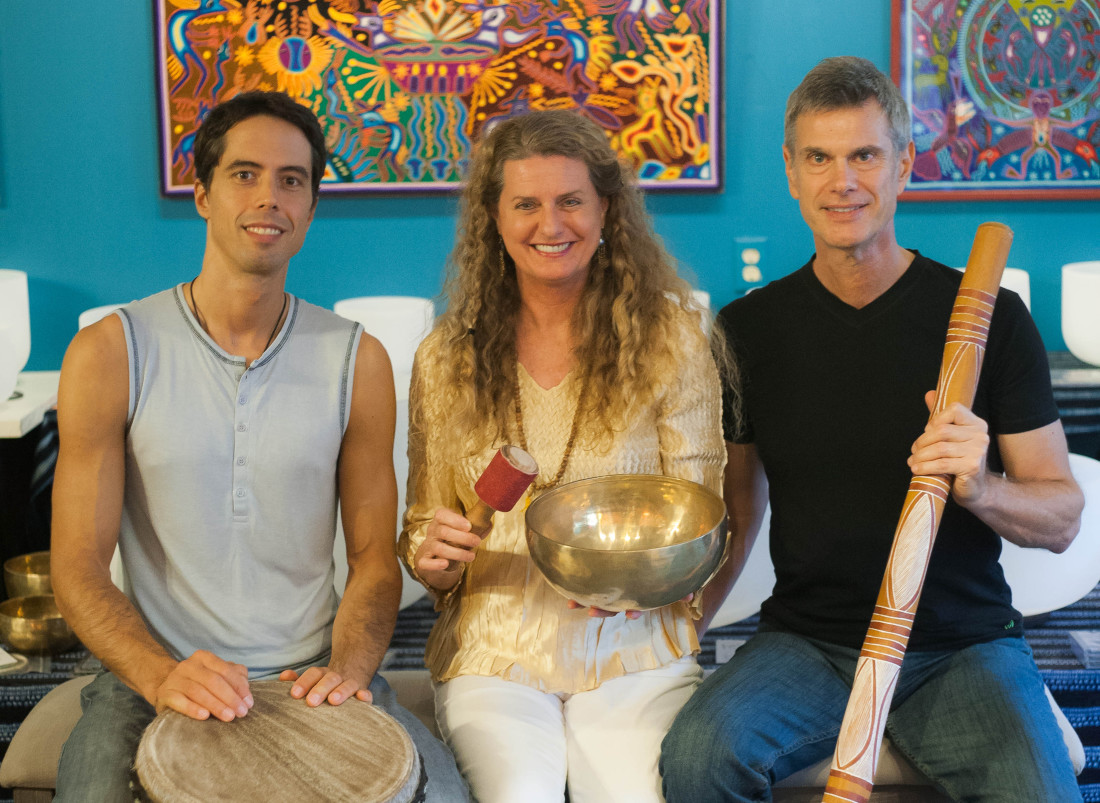“Sound healing” — what exactly is it? If you have been in Asheville for longer than a week, you’ve probably heard of it or seen a flyer for musical healing offerings. Seeking to learn more, I contacted local musicians, therapists and yoga teachers. I quickly found that sound is perhaps one of the most intangible subjects to write about, given that its very nature is vibrational, subjective and experiential.
This fall, a new local festival, Resonate, is launching with a specific emphasis on sound healing. In the Asheville area, there are large numbers of health care professionals who have recognized and adopted the therapeutic application of music for client health. Do they think there’s an innate difference between sound healing and music? I interviewed several individuals who use sound in a professional application for health and well-being.
“Music has an almost immediate effect on our physical and emotional experiences. Music can open our heart faster than anything,” says Linda Cammarata, a nurse and musician for over 20 years. For example, try listening to Beethoven’s “Ninth Symphony” followed by a song by Limp Bizkit and you will probably experience two profoundly different physical, emotional and mental responses, she suggests. As a nurse, Cammarata has witnessed music therapy provided to hospice, mental-health, neurological, rehabilitation and geriatric patients. In most cases, soothing music was a method to move people out of pain and into a state of well-being, she says. Now working with clients who suffer from insomnia and sleep deprivation, Cammarata has found that “chronic sleep issues can be relieved with deeply relaxing repetitive sounds.”
Imagine listening to crickets lightly chirping before bed versus a fire alarm. While extremes, these two sounds will have opposing affects on your nervous system and ability to fall into deep sleep.
Her husband, Larry Cammarata, a therapist who also teaches qi gong and tai chi, regularly incorporates music in sessions with his clients and students. “Some therapists assist their clients to use their own voices in ways that activate specific emotional states, not just for catharsis, but also for purposes of identifying and expressing emotions that may be consciously suppressed or unconsciously repressed,” he says. “For example, an individual may sound a soft sigh in response to talking to their therapist about a challenging relationship.”
In the qi gong classroom, students practice intonations and experience the sounds within their own bodies as a meditative and awareness exercise. Imagine the stillness and tranquility felt in listening to a heartbeat or following the light sound of your own breathing. “In a sound-healing setting, healing sounds are intentionally created to induce a state of open, safe, comfortable receptivity, which makes it relatively easy and enjoyable to relax into a state of peaceful harmony,” he says.

Similarly, Kristin Luna Ray, a musician and a yoga teacher, regularly sings and introduces mantras, or sacred meditative sounds, into her yoga classes and albums. “Mantra is a way to infuse sound with deep intention,” she says. During the course of a class, Luna Ray uses her own songs, which are generally written in Sanskrit and English, to create a theme or emotional experience for her students. “Many students have told me that the music allows them to access a deeper place during their yoga practice” she says.
Billy Zanski, owner of Skinny Beats Drum Shop & Gallery, hosts a sound-healing session every Sunday at noon with Linda GO at his shop on Eagle Street. “I’ve seen a lot of people find their way into my store that don’t know a thing about sound being healing,” says Zanski, “It is pretty mysterious.”
He comments that the person or people playing the instruments play a factor. “If they are playing with happiness, joy or the intention to create a safe space, then that comes through the performance,” he says. Talking further about the difference between music and sound healing, Zanski explains, “How many musicians do you know that call themselves a healer? Once you make a statement like that, you have to back it up with being healthy yourself. You can get really mental about ‘intention,’ but when a band is playing a really great song and everyone is happy, that’s sound healing.”
So the verdict is in. Sound healing can be found in a therapist’s office, a yoga class, within your own body, or at a bar with your friends in the wee hours of the night. How we relate to sound in our life can be the difference between a state of healing or a state of imbalance.
To learn more about sound healing, check out:
Strings of Lumina at OM Sanctuary ( 87 Richmond Hill Drive) from 7-9 p.m. on Saturday, Sept. 20. Strings of Lumina is a world-music, sound-healing group that includes Larry Cammarata, Linda Cammarata and Billy Zanski. Cost: $15.
Resonate festival at New Mountain Asheville (38 N. French Broad Ave.) from 1-10 p.m. on Saturday, Oct. 4. Tickets $30. Includes world-renowned artists Paradiso and Rasamayi, Linda GO and more.




Before you comment
The comments section is here to provide a platform for civil dialogue on the issues we face together as a local community. Xpress is committed to offering this platform for all voices, but when the tone of the discussion gets nasty or strays off topic, we believe many people choose not to participate. Xpress editors are determined to moderate comments to ensure a constructive interchange is maintained. All comments judged not to be in keeping with the spirit of civil discourse will be removed and repeat violators will be banned. See here for our terms of service. Thank you for being part of this effort to promote respectful discussion.